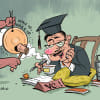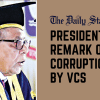Is ‘vice’ in VC the new normal?

In a country where public institutions are undermined by widespread corruption, it is perhaps too much to expect that public universities would be totally immune to it. But there is a certain line that the public expects teachers and administrators of a higher seat of learning not to go beyond, for them to not be indistinguishable from corrupt bureaucrats and public servants. But even that line is being crossed now, with those responsible for the universities often accused of corruption, impropriety and criminal activities.
The latest example emerged from the Islamic Arabic University (IAU). According to our report based on the findings of the University Grants Commission (UGC), the university's vice-chancellor (VC) has been involved in "illegal and unethical activities and corruption", so much so that "it is not possible to maintain smooth academic and administrative activities by retaining him as vice-chancellor." The call for his sacking from the UGC is a refreshing development, given its own spotty record as an overseer, but it just goes to show the extent to which the VC's seven-year tenure so far has been marked by corrupt practices.
The VC apparently made a habit of ignoring or bending rules whenever it came to recruitments. He recruited more people than stipulated in the university's recruiting advertisements, without the approval of the university syndicate. And even though the Islamic Arabic University Act 2013 doesn't give him the authority to appoint anyone on a temporary basis, he often breached it too. As well as illegal recruitments, the process through which candidates were shortlisted and appointed was also found to be shady. For example, many of the appointment-related papers were found to be "doctored". Among those thus appointed were both high-ranking and low-level officers. A member of the UGC probe committee also said that at least five teachers were also appointed, although as an affiliating university, the IAU has no academic departments of its own.
This level of corruption would not have been possible without the blessing of the VC and top officials of his administration. The question is, why has no action been taken against them yet?
Unfortunately, this is by no means an isolated development. Similar irregularities, not just in recruitment but in many other administrative aspects, have been reported fairly regularly in public universities across the country. Seldom, however, do we see any meaningful action to prevent this. One may recall the President's scathing remarks last month about the nepotism, corruption and professional insincerity of some of the VCs of public universities. In his speech, he stressed the importance of recruitments based on merit and quality, as well as establishing accountability for those in charge of the universities.
One may argue if the existing culture of politicised recruitment of VCs and other top officials in public universities will allow for an accountability mechanism to work. The strength that dishonest administrators draw from their political connection is undeniable. We must break this cycle. Universities must be allowed to not only teach honesty but also become an example of it themselves. That should begin with having honest and capable people at the helm of their administrations.


 For all latest news, follow The Daily Star's Google News channel.
For all latest news, follow The Daily Star's Google News channel. 










Comments